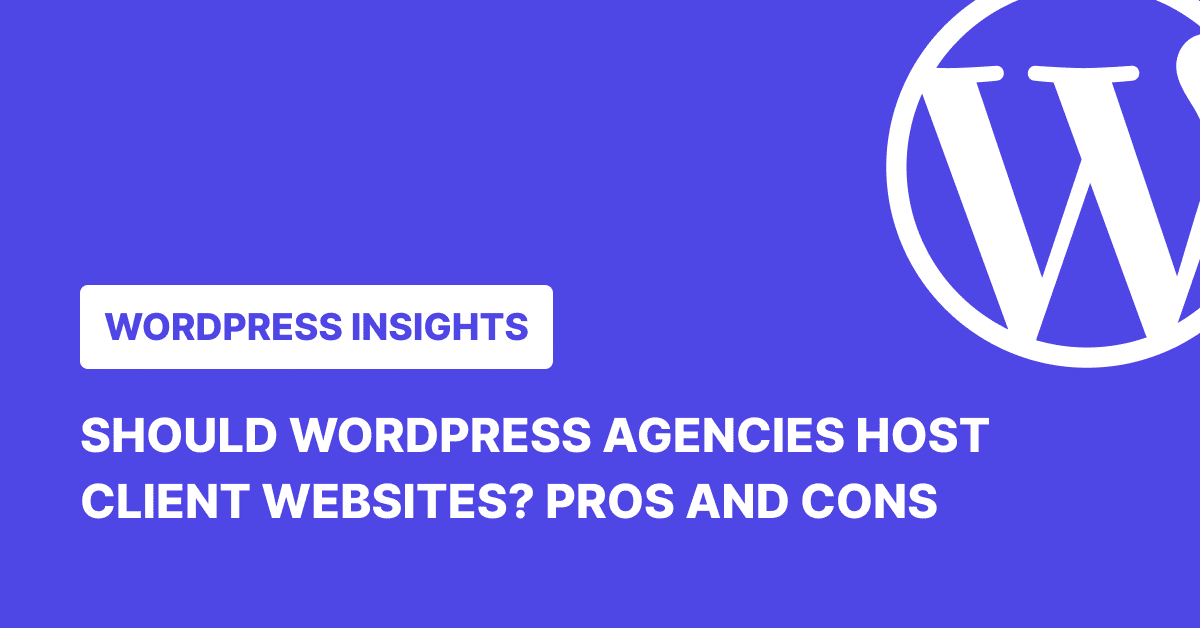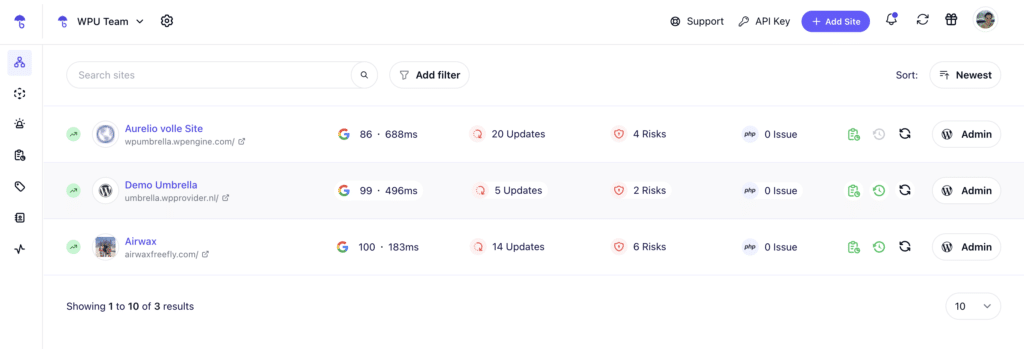Should WordPress Agencies Host Client Websites? Pros and Cons

Running a WordPress agency means making tough decisions about how much control you want over your clients’ infrastructure. One of the biggest choices is whether to host client websites yourself or let them manage their own hosting. This decision affects everything from your daily workflow to your monthly revenue.
Benefits of Agency-Managed Hosting
1. Consistent Technical Environment
When you control hosting, you eliminate unpredictable variables in website maintenance. Your sites run on the same PHP version, use compatible caching setups, and handle updates predictably. Plugin conflicts become rare because you’ve tested everything on your standardized stack. Without this consistency, you might spend hours troubleshooting why a plugin update works fine on most sites but breaks completely on a client’s shared hosting.
2. Streamlined Security Management
Managing security across multiple sites becomes exponentially easier when they’re all on your infrastructure. You can implement hardened server configurations, standardized firewall rules, and consistent security plugins across your entire client base. When sites are scattered across different hosts, each one becomes a unique security challenge. Different hosts have different security features, update schedules, and vulnerability response times. Your security is only as strong as the weakest host in your client portfolio.
3. Operational Efficiency
Maintaining 20+ websites is manageable when they share the same hosting environment. You can batch security updates, implement new tools globally, and spot performance patterns across sites. Everything from backups to staging environments works the same way. Spread those same sites across a dozen different hosting providers, and each maintenance task multiplies in complexity. Every host has different backup systems, control panels, and support procedures.
4. Revenue Model Benefits
Hosting creates predictable recurring revenue that grows with your client base. More importantly, it simplifies client billing as one monthly invoice covers maintenance, hosting, and support instead of splitting payments between multiple vendors.
Bundled hosting also justifies higher monthly fees. Clients pay for the convenience of single-vendor management and don’t have to coordinate between their developer and hosting company when issues arise.
5. Managed Hosting vs. Self-Hosting Reality
Modern agencies rarely manage actual servers anymore. Managed WordPress hosting platforms handle infrastructure concerns, including server updates, security patches, and uptime monitoring. You’re essentially reselling professional hosting with your support layer on top. This distinction matters because you’re not responsible for hardware failures or data center outages. Your managed hosting provider handles those issues while you focus on website-specific problems.
Why Some Agencies Avoid Hosting
1. Limited Liability Exposure
When clients manage their hosting, server problems aren’t your responsibility. Hardware failures, security breaches at the hosting level, and infrastructure outages become their hosting company’s problem, not yours. However, liability isn’t black and white. Well-written contracts can limit your responsibility even when you do provide hosting. Many agencies include clauses that differentiate between website issues (your responsibility) and platform outages (hosting provider’s responsibility).
2. Avoiding 24/7 Expectations
Hosting creates client expectations about response times, even when you’re using managed hosting. A site going down at midnight might generate urgent calls, regardless of whether the issue is actually within your control. Some agency owners prefer keeping their emergency contact limited to true website emergencies rather than any hosting-related problem.
3. Client Control and Specialized Needs
Certain clients need hosting that you can’t or don’t want to provide. Medical practices might require HIPAA-compliant infrastructure, or enterprises might have complex compliance requirements. Some clients have existing hosting relationships they prefer to maintain. Forcing these clients onto your hosting can create unnecessary friction in otherwise smooth relationships.
4. Simpler Client Transitions
When client relationships end, external hosting eliminates migration complexities. There’s no hosting account to transfer, no ongoing billing to resolve, and no technical handoff required.
The Costs of External Hosting
1. Debugging Without Server Access
When client sites go down on external hosting, troubleshooting becomes guesswork. You can’t check server logs, review resource usage, or verify configuration settings. Instead, you’re coordinating between the client and their hosting support team while trying to determine if the issue is website-related or server-related. Two-factor authentication complicates emergency access further. Getting authorization codes from clients during off-hours can turn quick fixes into extended outages.
2. Performance Variables Beyond Your Control
Websites that perform well in development might crawl once deployed to budget hosting. Resource limitations, outdated PHP versions, and poor caching configurations affect site performance regardless of your optimization work. These performance issues reflect poorly on your development quality, even when they’re entirely due to hosting limitations you can’t control.
3. Administrative Complexity at Scale
Managing clients across multiple hosting platforms means learning different control panels, maintaining separate login credentials, and adapting maintenance procedures for each environment. You’ll also handle hosting-related questions that aren’t technically your responsibility. Clients naturally turn to their web developer for all website issues, regardless of whether the problem originates from hosting or development.
Should Agencies Host Client Websites: Quick Comparison
| Factor | Agency-Managed Hosting | Client-Managed Hosting |
| Control & Consistency | Standardized environment, predictable behavior | Variables change per client’s host |
| Security Management | Unified security policies and monitoring | Fragmented across multiple platforms |
| Maintenance Efficiency | Batch operations, streamlined workflows | Host-specific procedures for each client |
| Revenue Model | Recurring monthly income, bundled billing | Project-based or separate hosting fees |
| Emergency Response | Direct platform access (via managed hosting) | Coordinate through the client and their host |
| Your Liability | Limited to website issues (with proper contracts) | Reduced hosting-related responsibility |
| Scalability | Manageable at scale (50+ sites) | Becomes unmanageable with growth |
| Client Autonomy | Limited hosting choices | Full control over hosting decisions |
Making It Work for Your Agency
If You Choose to Host
Start with a reputable managed WordPress hosting provider rather than managing servers yourself. Look for platforms that offer staging environments, automated backups, and reliable support for when you need escalation.
Price hosting to cover not just server costs, but the support time you’ll spend on hosting-related client questions. Set clear expectations about response times since most agencies aren’t available 24/7, and clients need to understand this upfront.
Write contracts that distinguish between website issues (your responsibility) and infrastructure problems (hosting provider’s responsibility). This protects you from liability for problems outside your control.
If You Let Clients Choose Hosting
Charge higher maintenance fees when clients use external hosting. The additional coordination time, variable troubleshooting complexity, and administrative overhead justify premium pricing.
Consider maintaining a list of approved hosting providers, such as platforms you’re comfortable working with and can access efficiently during emergencies. Refuse to work with particularly problematic hosts that create more support burden than the client relationship is worth.
WordPress management platforms like WP Umbrella can reduce some of the complexity when dealing with sites across multiple hosts. WP Umbrella helps agencies manage multiple WordPress sites from a single place and centralizes monitoring, updates, and reporting, regardless of where your sites are hosted. While they don’t eliminate all the challenges of external hosting, they can streamline the administrative burden and provide consistent uptime and performance monitoring, vulnerability scanning, and automated maintenance reporting across your client portfolio.

Also read: How a Top Dutch hosting company monetized WordPress maintenance with WP Umbrella.
Finding Middle Ground
Some agencies require their hosting for maintenance plan clients while allowing one-off project clients to handle their own hosting. Others mandate agency hosting only for e-commerce sites or clients requiring frequent updates.
The key is consistency in your policies and transparency with clients about why you’ve chosen your approach.
Verdict: Should WordPress Agencies Host Client Websites?
Your hosting decision depends on your agency’s size, technical comfort level, and growth plans. Newer agencies might find client-managed hosting simpler initially, while established agencies often need the operational consistency that comes with controlled hosting environments.
Consider your typical client, too. Tech-savvy clients might prefer managing their hosting, while small business owners usually appreciate the full-service approach.
Whatever you choose, avoid the worst outcome: an inconsistent mix where some clients are hosted and others aren’t, creating operational complexity without clear benefits. Pick an approach and stick with it, adjusting only as your agency’s needs genuinely change.
FAQs About Hosting Client Websites
It depends on your agency’s size, technical skills, and business model. Hosting gives you more control and recurring revenue, but it also comes with responsibility. Letting clients manage their hosting gives them more freedom, but can make maintenance and support harder for you.
Yes, many agencies turn hosting into a source of predictable monthly revenue by bundling it into care plans. Just make sure your pricing covers both the hosting costs and the support time you’ll spend.
The biggest risks are around liability and support. If something goes wrong, like downtime or a hacked site, clients will expect you to fix it. It’s important to set expectations clearly in your contract and work with reliable managed hosting providers.
Consistency. You can streamline your maintenance workflow, batch updates, and reduce bugs because you’re working with a known setup. It also makes troubleshooting faster since you’re not learning a new system for every client.
Yes. Most agencies use managed WordPress hosting providers and resell their plans. This gives you the benefits of control and revenue without needing to manage server hardware or worry about infrastructure issues.
Including hosting in your care plan makes billing simpler and helps you position yourself as a full-service provider. It also encourages clients to stick around longer since everything is handled through one relationship.
